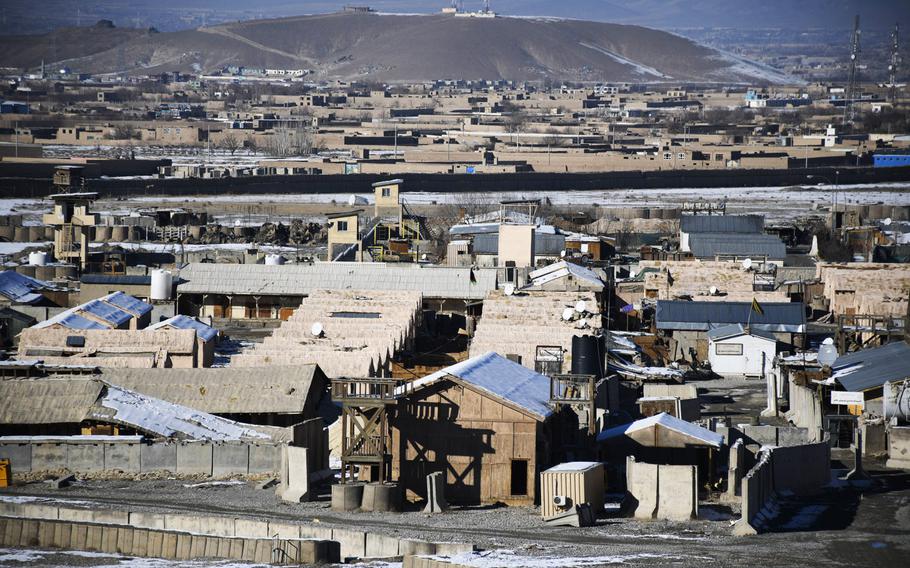
The view of Camp Maiwand in Logar province, Afghanistan. U.S. Army Command Sgt. Maj. Timothy Bolyard was killed in an insider attack on Sept. 3, 2018 on Afghan army base, which is located on part of what was once Forward Operating Base Shank. (J.P. Lawrence/Stars and Stripes)
KABUL, Afghanistan — He was shot in the back as he ran for cover, but Command Sgt. Maj. Timothy Bolyard managed to draw his pistol and spin around before falling to the ground.
The spirit Bolyard showed, revealed in a recently released Army report on the insider attack in Afghanistan that killed him, comforted his still-grieving son.
“Although reading the investigation report is very tough, it is very nice to know that my father didn’t go down without a fight,” Preston Bolyard, 22, said in a text message Tuesday.
Bolyard was killed on Sept. 3, 2018, in Logar province. The details of his last moments are buried in the investigation report, which was completed weeks after the insider attack but only recently made public.
Bolyard was the top enlisted soldier in the 1st Security Force Assistance Brigade, which specializes in training foreign militaries and was on its first, high-profile deployment. He was killed after he and other SFAB advisers attended a meeting with Brig. Gen. Abdul Raziq, commander of an Afghan army brigade at Camp Maiwand, to plan security for provincial elections.
His death came amid a spate of insider attacks in the fall of 2018, including one in October that killed two senior Afghan officials, wounded a U.S. general and narrowly missed the top American commander of the war effort.
The investigation report revealed new details of the September attack, including that Bolyard and the other advisers had left their protective gear at a small U.S. compound 400 yards away from the meeting. The soldiers were armed but wore no body armor to show the growing trust they felt toward their Afghan partners, said the report, which Army Times first made public last week.
Attendance at the meeting was greater than usual because Raziq had invited the Afghan national police, who would play a key role in ensuring security at the elections. The police usually did not attend such events.
In another break from the norm, Raziq said the police and intelligence leaders’ personal security details could keep their weapons as they waited in vehicles outside the meeting. Usually, Afghans were forbidden from carrying weapons to meetings attended by U.S. advisers, the report cited an official as saying.
After the meeting, as the Americans walked to the base cafeteria for lunch, two men on the police security detail opened fire, first with an AK-47, then with a vehicle-mounted PKM machine gun, the report said.
Bolyard was struck and died an hour later.
Another soldier, Staff Sgt. Steven McQueen, was shot in the head. He later credited the new type of helmet he was wearing with saving his life.
After the gunfire ceased, the Americans rushed Bolyard to a nearby forward surgical team, but they were unable to save him.
The two gunmen and two accomplices fled the base but were captured after about seven hours.
Nearly two years later, no militant group has claimed responsibility for the shooting.
With details of the attackers’ apprehension struck from the report and a section that focused on their possible motivation redacted, “We may never know the true motives behind the shooting,” Preston Bolyard said.
But he was comforted to learn that other soldiers tried to save his father, a six-time Bronze Star recipient and veteran of seven deployments, he said.
His father’s funeral in West Virginia weeks after the attack was packed with friends and those he had helped, his son recalled.
“I still look up to his leadership every day,” he said.
lawrence.jp@stripes.com Twitter: @jplawrence3